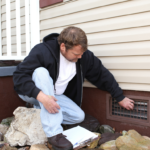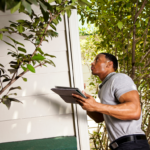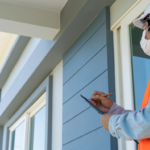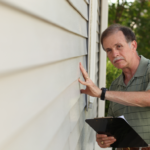Introduction to Home Inspections
As a dedicated REALTOR, I understand that whether you’re a first-time homebuyer or a seasoned real estate investor, knowing the significance of a detailed home inspection is crucial. Having completed ICA’s home inspection course, mandated by the Maryland Department of Labor Licensing Commission, for home inspectors, I bring an advanced understanding of home inspections to help my clients avoid costly surprises, ensure their safety, and negotiate better during the purchase process.
Click image to to find out more about certification
Ronn Davis REALTOR® & ICA Certified Home Inspector




Exterior Inspection
The exterior of a property offers the first glimpse into its overall condition, but it’s not just about aesthetics. My ICA home inspection training allows me to quality control the home inspector’s work on various external elements that can impact the property’s integrity and value. I attend all client inspections and welcome my clients to join, ensuring they are informed every step of the way and can see firsthand the thorough evaluation process involved.
- Foundation: It’s vital to check for cracks, unevenness, and signs of water damage.
- Roof: Looking for missing tiles, signs of aging, and assessing proper water drainage is essential.
- Siding: Evaluating the siding for any signs of deterioration or damage is crucial.
- Gutters and Downspouts: Ensuring they are securely attached and free from debris is necessary.
- Windows and Doors: Checking for proper sealing and operational integrity is important.
- Landscaping: Assessing the grading to ensure proper drainage away from the foundation is critical.
Interior Inspection
Inside the home, the inspection focuses on the structure, systems, and safety features to identify any hidden concerns.
- Floors, Walls, and Ceilings: It’s essential to check for signs of water damage, cracks, and uneven surfaces.
- Electrical Systems: Evaluating circuit breakers, outlets, and light fixtures is necessary.
- Plumbing: Testing all faucets and showers and looking for leaks or outdated piping is important.
- Heating and Cooling Systems: Ensuring they are operational and well-maintained is critical.
- Appliances: Verifying that all included appliances are functioning correctly is beneficial.
- Attics and Basements: Checking for adequate insulation and signs of pests or mold is imperative.
Pro Tip: Have your inspector use a thermal imaging camera to identify hidden issues such as poor insulation or moisture behind walls, which are often missed during standard inspections.
Systems Inspection
It is crucial for me to personally ensure that the home inspector does a thorough job in verifying that your home meets current safety standards to protect your family’s safety and investment.
- HVAC: Verifying the age, maintenance history, and functionality of the HVAC system is important.
- Electrical Panel: Checking for modern updates, safety issues, and capacity for future needs is necessary.
- Water Heater: Assessing the age, condition, and capacity to meet household needs is crucial.
- Sump Pump and Septic System: Testing for proper operation and maintenance is essential.
Pro Tip: As a homeowner regularly checking the HVAC system’s filters and maintaining records can significantly reduce the risk of costly repairs.
Safety Features
Me personally making sure that the home inspector performs a thorough job in verifying that your home meets current safety standards is crucial for protecting your investment.
- Smoke Detectors and Carbon Monoxide Detectors: Checking their presence and functionality is critical.
- Fire Safety: Ensuring all areas have appropriate access to fire exits is vital.
- Lead Paint and Asbestos: In older homes, these materials might be present, and testing may be necessary.
- Radon Testing: The EPA recommends testing for radon, a cancer-causing gas that’s undetectable without proper equipment, is beneficial (Learn more about radon).

Pro Tip: Ensure the installation of carbon monoxide detectors on every floor, especially near bedrooms, to ensure maximum safety.
How Ronn Davis Negotiates Repairs After a Home Inspection
One of the key benefits of working with me is my expertise in negotiating repairs after a home inspection. With a thorough understanding of inspection reports and common home issues, I work closely with a team of Long and Foster vetted home inspection experts to communicate with sellers, prioritize necessary repairs, or secure financial concessions.
This negotiation process is crucial for safeguarding my clients’ investments and ensuring they move into a home that meets their standards without unexpected expenses. My goal is to turn inspection findings into actionable benefits, helping clients get the best possible outcome from their home purchase.
My mission is to empower my clients with comprehensive insights and the confidence to make informed decisions. By uncovering potential issues that may escape the untrained eye, I strive to turn uncertainty into clarity. Investing in a thorough home inspection before purchasing a property isn’t just about saving thousands in potential repairs; it’s about providing the peace of mind that comes with knowing your future home is a sound investment. Together, with our Long & Foster family, we can ensure that your home-buying journey is filled with confidence and security.



